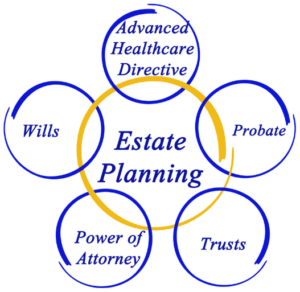
As a financial advisor and CPA, one of the top questions I receive are “what is a trust” and “do I need a trust?” There are a so many different types of trust (i.e. GRAT, CLAT, ILIT, GST, revocable, irrevocable, charitable, asset protection, the list goes on and on), but in this article we are only going to cover the revocable living trust (aka: inter vivos trust) because that is the most common. The main reason why people create trusts is to avoid probate, but a trust has many other benefits.
What is a trust and do I need a trust?
Think of a trust as a completely separate legal entity created by you (settlor or grantor). As the settlor, you fund the trust by transferring your property from your personal name into the name of the trust. The trust then owns the property. There is no tax implication for setting up a trust or transferring the property. Because it is a revocable trust, you still have full control of the assets within the trust. For example, if you transfer your brokerage account into the trust, you can still buy and sell investments in your account. Or, if you place your home in your trust, you can continue to live in the house, refinance, or sell it. Whether or not you need a trust depends on your circumstances.
A revocable trust is an extremely effective vehicle for bequeathing your assets to exactly who and when you want. You are considered the grantor of the trust (the person who funds the trust) and during your lifetime you will most likely also be the trustee. A successor trustee is chosen by you (the grantor) and is the person empowered to manage the trust according to your wishes upon your passing. You can change your successor trustee anytime while you are alive. What makes a revocable trust powerful is your ability to dictate what happens to your assets. For example, you can write in your trust that your kids are not entitled to any money until they reach age 35, are married, or have a degree in accounting. You can get very specific. You can also disinherit a close relative. The trust also allows you to name a person to look after your kids who may not be a relative (of course you want to ask them first). As you can see, the benefit of the trust goes way beyond just avoiding probate.
Why you don’t need a trust
Not everyone needs a trust. If you are single, have minimal assets, and no dependents, then you probably don’t need a formalized estate plan, at least not one that cannot be accomplished with basic titling of your accounts. But, if you are married, have kids, own a business, or have sizable assets, then you need a formalized estate plan. The question becomes what kind of estate plan do you need? The answer is it depends. Your estate plan will depend on how complicated your situation is. For example, let’s assume you were formally married with 2 young kids and now you have married someone else who also has 2 young kids. To complicate the matter even more, let’s further assume that the two of you have another child together and you each have sizable assets prior to getting married. How do you divide your assets when one of you passes? As you can see, this can get quite complicated very quickly and without a formalized estate plan in place, you can almost guarantee that the heirs will want their share of the money. The larger the estate, the more long-lost relatives suddenly appear claiming you were their favorite uncle/aunt.
What is probate?
In simple terms, probate is when a court has to step-in after a person dies to determine who are the rightful owners of that person’s assets because there is no estate plan in place to identify successors. This is not ideal for many because some people don’t get along with their siblings and in probate, that sibling will be entitled to your assets upon your passing. Of course the probate courts and lawyers don’t work for free, so if you don’t want your hard earned money to get frittered away, then set up an estate plan to avoid probate. Also, probate is a public process so unless you want to air your dirty laundry for the world to see, take steps to avoid probate. There are some simple ways to avoid probate, but if you have meaningful assets, a family, or are married, then it would behoove you to create something more formalized. Another benefit of a trust is its privacy. Unlike a will which is a public document and costly to administer through the probate court system, a trust is private and much less expensive.
Do I need an attorney to create a trust?
No, you do not need an attorney to create a trust. You can create a trust or a will on your own for a very low cost by using popular online sites such as LegalZoom. But be advised that if you use the do-it-yourself (DYI) strategy, you may be creating more headache and additional costs for yourself and your heirs. The IRS and states do not care what your intentions were; if you drafted the wrong form or forgot to sign a page, it can negate your initial intentions. As a CPA firm, we regularly see clients set up their own corporations through LegalZoom only to find out later that they did not follow the proper steps and now their corporation is either invalid, the wrong type, or unnecessarily registered in a different state. As a result, they end up paying additional money to a CPA to fix the problem.
Does a will avoid probate?
No, a will does not avoid probate. If you die with only a will, a court and attorneys will still have to determine who the rightful owners are of your assets. This will be costly and leave less assets for your intended beneficiaries. A will is also a public document as soon as it is filed with the court so anyone can read about your personal financial situation and family story.
Does a trust have its own tax ID?
A revocable trust does not have it’s own tax ID because even though it is a separate entity, you as the grantor still control the assets. A revocable trust also does not need to file a separate tax return.
Taxes and estate planning are very complicated. One minor mistake and it could cost you and/or your heirs dearly. While it is tempting to use LegalZoom or other similar do it yourself platforms, we highly recommend you engage a qualified CPA and a trusts and estate attorney (not your cousin who specializes in personal injury) to establish an estate plan. ACap is a CPA firm and we also have contacts with excellent trusts and estate attorneys. Contact us for a free initial consultation or if you want a referral to an estate attorney.
Looking for an independent fiduciary financial advisor who can advise you on investments, retirement, real estate, alternative assets, and taxes? Contact ACap Advisors & Accountants to schedule a free initial consultation. Our clients include individuals, small businesses, entrepreneurs, and anyone serious about saving and investing for their future.
Ara Oghoorian, CFA, CFP, CPA is the founder and president of ACap Advisors & Accountants in Los Angeles, CA.









